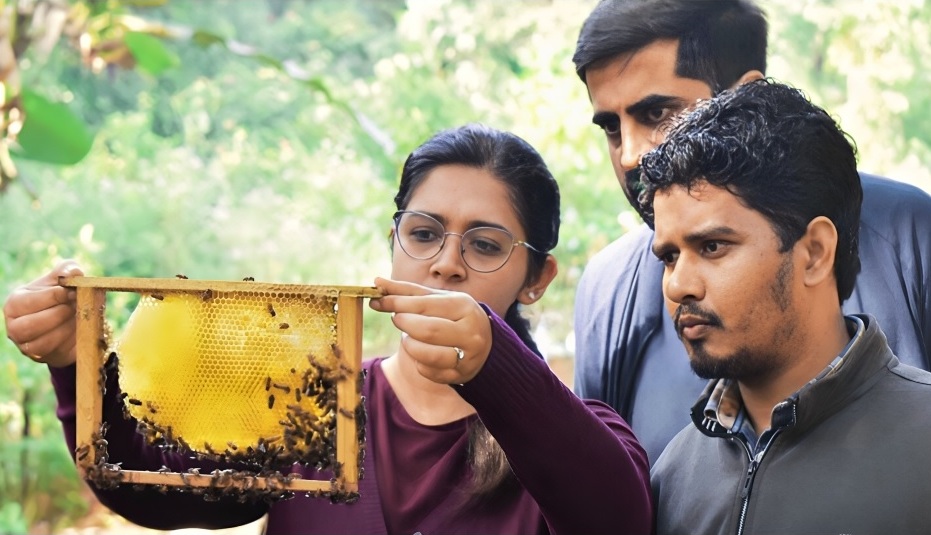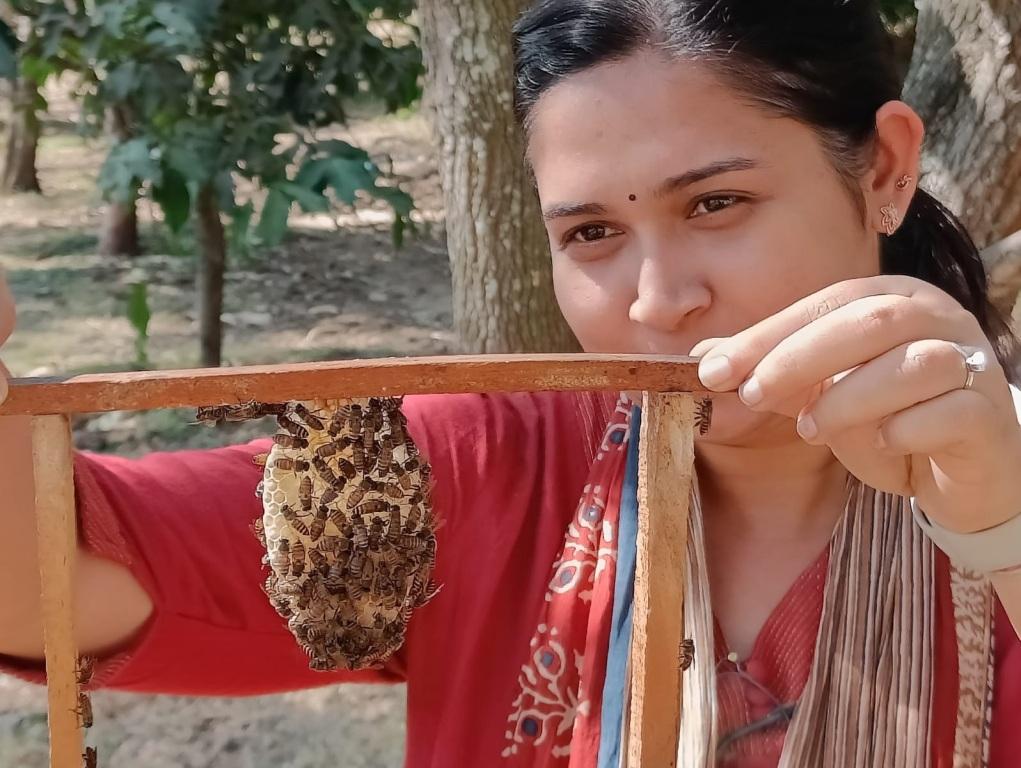Hive Hopes & Sweet Future: Restoring Ecosystems, One Bee at a Time
In a world grappling with complex climate challenges, Monika Shukla is a rare visionary with a simple yet radical philosophy: Like bees, work with purpose, nurture connections and leave the world sweeter than you found it.

By integrating women empowerment, fair trade and climate resilience into its vision, the movement strives to restore a thriving global ecosystem where the hum of bees symbolises hope, prosperity and sustainability.
In this exclusive interview, Monika shares her insights on redefining leadership in the sustainability sector, the urgency of rewilding both ecosystems and mindsets, and the untapped power of local wisdom in shaping a regenerative future.
For anyone ready to trade despair for determination, Monika’s words are a rallying cry to join the movement and transform hope into action:
Q. What prompted you to make a switch from your previous corporate job to becoming a full-time entrepreneur?
A. My journey from being a corporate technologist to becoming a social entrepreneur has been driven by a deep commitment to creating impactful change. Starting my career as a technologist at Goldman Sachs after graduating with a silver medal from IIT Kharagpur, I found myself increasingly drawn to initiatives in corporate sustainability and community engagement. My work in employee engagement and environmental initiatives sparked something within me, a curiosity about how I could leverage my skills to create a larger, more meaningful impact.
The turning point came when I joined the Young India Fellowship Program, where my perspective broadened dramatically. Immersed in rural microeconomics, public policy, and community challenges, I began working with social enterprises and NGOs and saw firsthand how innovation could drive real change at the grassroots. Several experiences have shaped my understanding of how solutions can be shared, adapted, and scaled to tackle diverse challenges.
Building on this belief, I co-founded LetsEndorse with Varun (now my husband), with the vision of creating a platform where social innovators could connect with grassroots organisations to bring scalable solutions to local challenges. Over four years, LetsEndorse grew into a vibrant community of over 500 social innovators from 34 countries, working with 2,500+ NGOs to deploy 450 solutions across India. Later, in partnership with SIDBI, we evolved the platform to support micro-entrepreneurs, focusing on credit access and capacity building to help thousands achieve sustainable livelihoods.
Through this work with rural communities, we began to recognize the vast, untapped potential of value-chain linkages and income sustainability for entrepreneurs and decided to explore India's agricultural landscape. Travelling across 18 states and meeting hundreds of beekeepers, we witnessed the fragmented value chain and the challenges faced by smallholder beekeepers. It was clear that with the right support, beekeeping could become a powerful driver of sustainable income, biodiversity, and rural resilience. This realisation led me to co-found Humble Bee with the mission of sparking a “Golden Revolution” in Indian agriculture through beekeeping.
Humble Bee is more than a honey business—it’s about building an entire ecosystem around beekeeping that empowers rural communities, strengthens biodiversity, and fosters resilient livelihoods. My journey has been about embracing adaptability, inclusivity, and sustainability, and through Humble Bee, I’m committed to creating a more equitable, resilient future for smallholder farmers, women, and marginalised communities across India.
Q. How has been your personal journey of switching careers?
A. My personal journey from the corporate world to the social sector has been filled with ups and downs, but it has also been immensely rewarding in terms of learning and personal growth. Transitioning from a coveted job at the young age of 24 meant stepping out of my comfort zone and embracing uncertainty.
Initially, it was challenging to navigate the complexities of the social sector, where the rules and metrics of success differ greatly from the corporate environment. However, every obstacle offered valuable lessons that shaped my perspective and deepened my commitment to making a positive impact.
I've had the privilege of meeting incredible individuals and communities who inspire me daily, reminding me of the importance of resilience and adaptability. This journey has taught me that true success isn’t just measured by financial metrics but by the lives we touch and the sustainable changes we create. Overall, my career switch has fostered a sense of purpose, and I’m grateful for the opportunity to contribute to something larger than myself.
Q. Tell us about the Humble Bee Movement.
A. The Humble Bee Movement is about so much more than producing honey; it’s a mission to ignite a “Golden Revolution” in Indian agriculture through beekeeping. Humble Bee was born from the idea that beekeeping could transform rural livelihoods, strengthen ecosystems, and enhance agricultural sustainability.
We aim to empower thousands of smallholder farmers and beekeepers by making beekeeping a cornerstone of sustainable income, biodiversity, and food security. At its core, the Humble Bee Movement focuses on building a robust ecosystem around beekeeping. This includes providing beekeepers with precision-engineered hives, essential training, and continuous support to elevate the quality of honey and hive products.
Our vision extends beyond economic impact; it’s about re-establishing the essential role that bees play in our ecosystem. Bees contribute significantly to crop pollination, impacting yields for various crops and supporting biodiversity. By integrating beekeeping into the agricultural landscape, we can positively influence the health of our environment while fostering economic opportunities for rural communities.
Through Humble Bee, we want to inspire a new way of thinking about agriculture and the environment, where the livelihood of the beekeeper and the well-being of our planet are deeply connected. This is our movement: a call to empower, protect, and sustainably grow, one beehive at a time.
Q. How does it tie in with your larger goal of empowering women?

Equipping women with training in sustainable, scientific beekeeping empowers them to manage their own hives confidently, building both expertise and economic resilience. This income diversification helps households reduce their dependence on subsistence farming or daily-wage labour. It also gives women the agency to reinvest in their families and communities, fostering a cycle of positive change.
Beekeeping aligns seamlessly with women’s roles in rural settings, as it doesn’t require large landholdings or excessive time. This flexibility allows them to contribute meaningfully to household income without neglecting other responsibilities. Ultimately, we believe that empowering women creates ripple effects of social and economic upliftment, and beekeeping provides an accessible, scalable platform for this transformation.
Q. When did you start Humble Bee, and how many of your goals have you been able to address since then?
A. We started Humble Bee in 2021 with a vision to transform rural India through sustainable beekeeping practices. In just a few years, we have made significant progress toward our goals.
We now operate across five states, impacting communities in diverse regions, from tiger reserves and forest-fringe areas to intensive agricultural zones. Our initiatives have helped hundreds of smallholder farmers and beekeepers access scientific training, better equipment, and reliable market linkages. By enhancing the quality of honey and hive products, we’re creating sustainable income opportunities while promoting ecological balance.
While we’ve achieved many milestones, our journey is far from over. We’re continuously innovating, learning, and scaling our efforts to ensure that every community we work with has the resources and support to thrive.
Q. What specific problem are you solving through Humble Bee?
A. Humble Bee addresses a multifaceted problem rooted in agricultural inefficiencies, economic instability, and environmental degradation. Smallholder farmers and beekeepers often face fragmented value chains, lack access to reliable markets, and receive inadequate technical training.
This lack of support results in low honey production, inadequate crop pollination, and an over-reliance on chemical fertilisers, which harm soil and water health and exacerbate climate effects. At the same time, declining pollinator populations threaten food security and biodiversity.
Humble Bee solves these problems by creating an integrated ecosystem for beekeeping. We provide scientific training, high-quality equipment, and market linkages to empower rural communities. By enhancing hive management, improving honey quality, and strengthening crop pollination, we’re addressing ecological and economic challenges simultaneously.
Q. Is your organisation addressing any UN SDGs? If yes, please specify which ones in particular.
A. Yes, our work directly aligns with several United Nations Sustainable Development Goals (SDGs), including:
SDG 1 (No Poverty): By creating sustainable livelihoods for smallholder farmers and beekeepers.
SDG 2 (Zero Hunger): Through enhanced crop pollination, increasing agricultural yields and food security.
SDG 5 (Gender Equality): By empowering women to achieve financial independence through beekeeping.
SDG 8 (Decent Work and Economic Growth): By fostering entrepreneurship and value-chain integration in rural areas.
SDG 13 (Climate Action): By promoting biodiversity and sustainable agricultural practices.
SDG 15 (Life on Land): Through conservation efforts that support pollinator populations and healthy ecosystems.
Humble Bee is designed to meaningfully contribute to these goals, creating ripple effects that extend beyond beekeeping to foster a more sustainable and resilient future.
Q. How are you using technology for social impact through this venture?
A. Technology is at the heart of our approach to scaling beekeeping in India. We use data-driven insights, IoT-enabled hive monitoring systems, and mobile applications to empower beekeepers. These tools allow them to track hive health, optimise honey production, and manage pollination services more efficiently.
This scalable solution enhances hive management while also improving honey production and crop pollination. Additionally, we leverage technology to connect smallholder beekeepers with reliable markets, ensuring fair prices and greater income security. By integrating technology into our model, we’re making beekeeping more accessible, efficient and impactful for rural communities.
Q. What would you advise startups that aim to work in the area of sustainability and women empowerment?
A. My advice to startups is to stay rooted in purpose and keep the community at the centre of your initiatives. True impact comes from listening to people’s needs and designing solutions that are inclusive and scalable.
Start small but dream big. Build partnerships, leverage technology, and don’t shy away from experimenting. Patience is key, social change takes time, but every small step matters.

댓글
댓글 쓰기